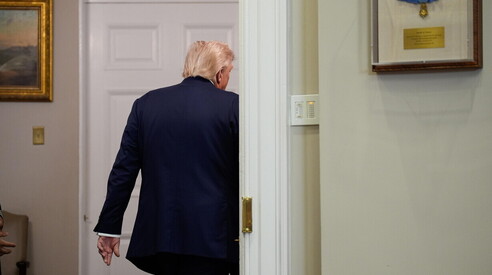Trump's own goal that could increase the trade deficit


ANSA photo
The grossest of misunderstandings
Pursuing trade balance at all costs would mean producing goods domestically that cannot be efficiently produced on American soil, due to a lack of resources or capacity. And bilateral agreements might not be a victory for the White House.
On the same topic:
In his executive order on Friday, August 1, launching a new barrage of tariffs, Donald Trump reiterated that the trade deficit poses an extraordinary threat to national security and the American economy. Thus, poor Lesotho, guilty of selling diamonds to the United States, will face a 15 percent tariff. With an average income of five dollars a day, the small African country cannot afford to import anything from the United States, nor can it move its mines from one continent to another .
The pursuit of balanced trade at all costs, which the MAGAs have placed at the heart of their agenda, ignores the fundamentals of economics. International trade is beneficial because it allows each country to specialize in productions in which it has a comparative advantage. Eliminating the deficit with each individual trading partner would mean producing goods domestically that cannot be produced efficiently on American soil, lacking the resources or capacity to do so cost-effectively.
The most paradoxical aspect of this approach, however, lies elsewhere. While claiming to want to reduce the trade deficit, Trump is signing bilateral agreements that risk increasing it . The agreements negotiated so far call on trading partners to invest massively in the United States, in the hope of strengthening a manufacturing sector that has lost jobs in recent decades, and to incentivize the return of delocalized production. Beyond the questionable binding nature of these agreements (which, in the case of Europe, is practically nonexistent), direct investments from Europe and Japan, if they were ever realized, would increase the deficit rather than reduce it. On the one hand, new factories require imports of machinery, components, and expertise, primarily produced in the countries that signed the agreements. On the other, the profits of foreign companies established in the United States are repatriated, further worsening the current account balance . Moreover, even the goal of bringing jobs back to the manufacturing sector is questionable. White House economists seem to ignore that the decline in industrial employment has been more than offset by growth in service employment: a process typical of advanced economies, where production factors shift to sectors with greater efficiency and value added, increasing overall well-being.
From an accounting perspective, the trade agreements signed so far (if they ever materialize) are inevitably destined to increase the current account deficit. The more capital flows in, the greater future outflows will be—in the form of additional imports or profit repatriation . Trump's strategy therefore risks worsening the imbalance he claims to want to correct. Promoting foreign direct investment essentially means accepting that Europe and Japan continue to play their traditional roles as economies exporting excess savings, while America remains the major absorber of capital, accumulating a trade deficit. With a paradoxical difference: today, this arrangement has been ratified as a result of negotiations and presented as a victory . The contradiction is evident: if the goal was to reduce the trade deficit, the agreements should have aimed to encourage exports and American direct investment abroad, not the inflow of foreign capital. Opening European markets to American products, for example by removing barriers to digital competition, would have had a much more significant impact. This was the priority of American multinationals, but the EU managed to reject it, defending its regulatory autonomy. Trump's latest own goal stems from the grossest of misunderstandings: there's no reason to extol exports as such . Exports are a means, not an end. The end is imports, within a framework of trade that, if well-regulated, benefits all parties.
More on these topics:
ilmanifesto





